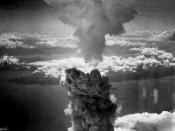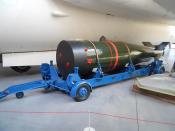Post-Cold War: US Nuclear Deterrence "The current questioning of nuclear deterrence implies something other than it's withering away. There is no post nuclear strategy"æThe nuclear instrument remains the central element in the defense of the nuclear powers." -Anonymous French analyst For the citizens of the United States nuclear arms in the post-cold war era are no longer looked upon as deterrents from war, rather, they are nothing more than burdensome reminders of the cold war (Destler 1). Nuclear weapons have lost their relevance since they are no longer needed to fend off communists and are now counterproductive to American policy as well as international policy (Destler 1). While deterrence is still vital, the presence of nuclear arms is no longer perceived as a necessity. Post-cold war deterrence has included preventive diplomacy (such as embargos), and military deterrence using modern conventional weaponry (Hopkins 1). As conventional forces begin to play a greater role in deterrence the question for the need of nuclear arms arises.
Is conventional deterrence enough to protect the United States? Should nuclear arms be rejected in the seemingly more peaceful post-cold war era? Considering the high level of geopolitical uncertainty in the world the eradication of nuclear arms is impossible. The evolving relationships between foreign states and the US response to their actions will affect the need for nuclear arms, deterrent strategies, and wisdom for nuclear disarmament (Hopkins 1). The United States must proceed with caution when dealing with foreign relations. Nuclear weaponry must still play an important role in deterrence with regards to US national security.
Deterrence, on the national security level, can be defined as preventing war through fear of punishment, fear of defeat, or fear of an undefined negative consequence (Hopkins 1). Fear is essential in deterrence and it is most likely to...


